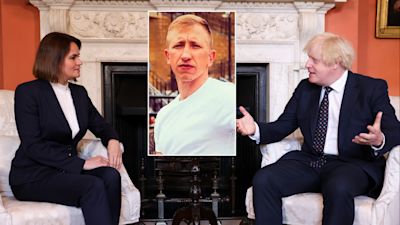'We're on your side': Boris Johnson backs Belarus opposition amid activist's death

ITV News Political Correspondent Carl Dinnen heard from Belarus' opposition leader after her visit to Downing Street
Boris Johnson has given his emphatic backing to the opposition in Belarus after an exiled activist was found dead in Ukraine, sparking a murder investigation.
The prime minister, meeting Belarusian opposition leader Sviatlana Tsikhanouskaya in Downing Street, told her: "We are very much on your side, very much in support of what you are doing".
The meeting came after shortly activist Vitaly Shishov was found hanged in a Kyiv park close to his home on Tuesday - just hours after he had been reported missing during a morning run.
The leader of Kyiv-based Belarusian House in Ukraine - a group which helps Belarusians fleeing persecution with their legal status in Ukraine, accommodation and employment - had recently been followed by strangers while out running, his friends said.
Ukrainian officers are looking into whether the killing was made to look like suicide, a police statement said.
Mr Johnson told Ms Tsikhanouskaya the UK is "committed to supporting human rights and civil society in Belarus".
He added: "We strongly support you, strongly support Belarus, the Belarusian people and I think we were among the first to put in sanctions after the hijacking of Roman Protasevich, the flight that was diverted."
After the meeting Ms Tsikhanouskaya said she is "sure" there will be further help from the British Government for the people of Belarus.
But she said it was too early to comment on the death of Mr Shishov.
She added: "I can disappear at any moment. I understand this, but I should do what I am doing.
"I can't stop, because I feel responsibility for the future of my country, the same as all those Belarusians felt fighting the government, feel their responsibility.
"But I know that even if I disappear one day this movement will continue without me."
Downing Street released a statement following the meeting, reiterating the UK's support for human rights in Belarus.
The statement said: “The prime minister and Mrs Tikhanovskaya agreed that the British and Belarusian people share fundamental values such as a belief in democracy, human rights and rule of law.
"The prime minister said the UK stands in solidarity of the people of Belarus and will continue to take action to support them.”
Ahead of the meeting, Minister Gillian Keegan said the pair would have "important" discussions around the case of Belarusian Olympic sprinter Krystsina Tsimanouskaya, who was granted a Polish humanitarian visa this week amid her fears for safety about returning home following the Games.
The UK's "concern for human rights, at home and abroad, is of course paramount", said Ms Keegan ahead of the meeting.
Olympic athlete Tsimanouskaya, who refused to return to her homeland on Monday, said in an interview that officials from her country “made it clear” that she would be kicked out of the national team and face punishment upon return to Belarus.
The threat came after she posted online about her annoyance at being entered into the 4x400m “behind [her] back” after Belarus had failed to secure the correct doping test for other athletes.
She was due to race in the 200 metre heats at the Olympic Stadium on Monday, but had her Games cut short when she said she was taken to the airport to board a Turkish Airlines flight.
“They made it clear that upon return home I would definitely face some form of punishment, and that if I were to refuse to return home and would run in the 200m race, I would be fired and kicked out of the national team,” Tsimanouskaya told the Associated Press.
“There were also thinly disguised hints that more would await me.”
At the time she told a Reuters reporter via Telegram that the Belarusian head coach had turned up at her room on Sunday at the athletes village and told her she had to leave.
"The head coach came over to me and said there had been an order from above to remove me," she wrote in the message.
"At 5 (pm) they came my room and told me to pack and they took me to the airport."
But she refused to board the flight, telling Reuters: "I will not return to Belarus."
Tsimanouskaya's husband, Arseni Zhdanevich, has also left Belarus and travelled to Ukraine, it has been confirmed.
The Belarusian Olympic Committee said in a statement coaches had decided to withdraw Tsimanouskaya from the Games on doctors' advice about her "emotional, psychological state".
Authorities in Belarus have ramped up the pressure against non-governmental organisations and independent media, conducting more than 200 raids of offices and apartments of activists and journalists in July alone, and detaining dozens of people.
Authoritarian President Alexander Lukashenko has vowed to continue what he called a “mopping-up operation” against civil society activists whom he has denounced as “bandits and foreign agents.”
Mr Lukashenko faced months of protests triggered by his being awarded a sixth term in an August 2020 vote that the opposition and the West saw as rigged.
He responded to demonstrations with a massive crackdown that saw more than 35,000 people arrested and thousands beaten by police.
The Belarusian House in Ukraine said in a statement Tuesday that Mr Shishov was forced to move to Ukraine in the autumn of 2020, when anti-government protests and crackdown on demonstrators in Belarus were in full swing.
In Ukraine, he was under surveillance, and “both local sources and our people in Belarus” have alerted the group to the possibility of “various provocations, including kidnapping and liquidation.”
“There is no doubt that this was a planned operation by security operatives to liquidate a Belarusian, dangerous for the regime.
"We will continue to fight for the truth about Vitaly’s death,” the group said.